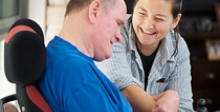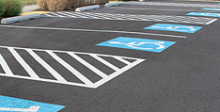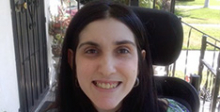Internal mini form
Contact Us Today
Humans are born with inherent rights that seem like second nature – to be treated with respect, to have equal opportunity, to be included, and to find school, work and community spaces accessible. These rights are no different for individuals with a disability. But, just because people with special needs have rights does not always mean others will respect the rules. When this occurs, advocacy is needed.
Advocating for a child or an adult with Cerebral Palsy is an active, not a passive, pursuit. Most parents expect to advocate for their child in certain settings, such as when applying for government assistance. Being an advocate actually extends into other areas of life; making sure a child has ample opportunity to participate in sports or activities, creating awareness of disability to thwart bullish behavior, conceptualizing opportunities to further inclusion and accessibility. Advocacy furthers the rights, and joy of others who at times need an additional layer of protection.
About advocacy
When someone, or something, causes stress or discontent in our lives, seeking an advocate to look out for our interests is a logical response. The fact of the matter, however, is that many of us – especially children – need an advocate full time.
Parents often fill that role – in requesting an early diagnosis so their child can qualify for treatment options, justifying health insurance coverage for additional therapy sessions, maintaining an active presence in the education IEP planning, and creating awareness amongst their child’s schoolmates in an attempt to ward off peer pressure and bully abuse.
A parent’s role as a protector and confidante is naturally extended in the role of an advocate. Being an advocate for a child means making sure that at every turn, a child receives all of the medical attention he or she needs, the benefits of a mainstreamed education, and has the opportunity to participate in activities with peers might sound simple, but there are times when a parent will encounter opposition.
Transitioning into adulthood, children are taught skills for self-preservation, more so than children without disabilities. They learn prevention measures, safety guidelines, and emergency contingencies to assist with the unknowns that life throws at us all, at times. However, there are times when even adults with Cerebral Palsy will require an advocate for an issue at hand – denials in SSDI coverage, equipment procurement not easily covered under insurance, and housing or rental issues, for example.
Standing up for a child is a first instinct for a parent. Standing up for oneself is skill usually developed out of necessity. There are, however, strategies that can bring about the most desirable results.
















